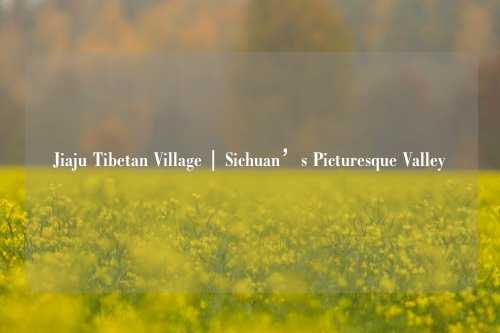Jiaju Tibetan Village | Sichuan’s Picturesque Valley
The Enchanting Beauty of Jiaju Tibetan Village
Deep in the folds of Sichuan Province lies a village that time seems to have forgotten—one where the rhythm of life flows slowly, and the whispers of nature and culture intertwine. This is Jiaju Tibetan Village, a haven where the modern world feels distant, and the soul can find solace in the embrace of untouched beauty.

Jiaju is not just a village; it is a living tapestry of colors, textures, and traditions that paint a picture of Tibetan culture. Perched on a slope overlooking a valley that is a feast for the eyes, the village is a symphony of terraced farmland, vibrant prayer flags, and stone houses. The air here is crisp, carrying the scent of pine and the promise of adventure. Every corner of Jiaju tells a story, inviting visitors to step into a world where the past is alive and well.
One of the most striking features of Jiaju is its breathtaking natural scenery. The valley, a patchwork of emerald fields and golden rape blossoms, is a testament to the harmony between man and nature. Walking through the village, you are surrounded by the gentle slopes of the mountains, their peaks dusted with snow, and the gurgling溪流that wind their way through the fields. It is a landscape that feels almostOtherworldly, as though you have stumbled into a postcard come to life.
The architecture of Jiaju is another marvel that draws visitors to this remote corner of Sichuan. The village is home to an array of传统碉房, or "towers," which are multi-story stone buildings that have been a hallmark of Tibetan construction for centuries. These structures, with their solid walls and sloping roofs, seem to defy time, standing as silent sentinels that have witnessed the passage of generations. Each碉房tells a story of resilience and adaptability, reflecting the ingenuity of the Tibetan people who built them to withstand the harsh winters and the ever-present threat of avalanches.
As you wander through the village, you cannot help but notice the details that make Jiaju so special. The prayer flags that flutter in the breeze, each one a vibrant reminder of the villagers' spiritual beliefs. The ritualistic spinning of the prayer wheels, a sound that is as much a part of the village's symphony as the rustling leaves. And the smiling faces of the locals, their warm hospitality a stark contrast to the anonymity of urban life. These elements combine to create an atmosphere of peace and connection, one that invites you to slow down and savor the moment.
But Jiaju is not just about the present; it is a window into the past. The village retains much of its way of life, offering visitors a rare glimpse into the customs and practices of the Tibetan people. From the way the villagers farm the land, using time-honored methods passed down through generations, to the way they celebrate festivals and rituals, Jiaju is a place where tradition and modernity coexist in perfect harmony. It is a reminder that, despite the march of time, some things are worth preserving, and some ways of life are too beautiful to be forgotten.
For those who seek more than just a picturesque backdrop, Jiaju offers a wealth of experiences. Visitors can join the locals in their daily rituals, such as tending to the fields or participating in the preparation of Tibetan foods. The village is also home to a number of sites, including monasteries and shrines, that provide a deeper insight into the spiritual and religious practices of the Tibetan community. These experiences are more than just moments of entertainment; they are opportunities to connect with a culture that is both ancient and enduring.
Jiaju Tibetan Village is more than just a destination; it is an experience, a journey into a world where the beauty of nature and the richness of culture come together to create something truly special. Whether you are searching for adventure, peace, or a deeper connection to the people and traditions of Sichuan, Jiaju offers it all. It is a place where the modern world feels distant, and where the simple pleasures of life are celebrated in every moment.
A Journey into Tibetan Culture and Natural Beauty
As you delve deeper into Jiaju Tibetan Village, you begin to appreciate the balance between the village's natural surroundings and its heritage. This harmony is evident in every aspect of life in Jiaju, from the way the villagers interact with the environment to the way they preserve their traditions. It is a place where the beauty of the landscape is matched only by the warmth of the people and the richness of their culture.
One of the most aspects of Jiaju is its culinary traditions. The village is home to a variety of Tibetan delicacies that reflect the ingenuity and resourcefulness of the local people. From the delicious Tibetan-style dumplings, known as "momos," to the hearty stews made with locally sourced ingredients, the food in Jiaju is a testament to the fusion of Tibetan and Sichuanese flavors. Each dish tells a story of the village's history and its connection to the land. For those who are adventure seekers, Jiaju also offers the chance to try local specialties such as yak meat and Tibetan butter tea, which are not only delicious but also a part of the local cuisine.
In addition to its culinary offerings, Jiaju is a treasure trove of crafts and art. The village is home to many skilled artisans who create beautiful handmade items, from woven rugs to Tibetan thangkas—sacred religious paintings that are both artistically stunning and spiritually significant. These crafts are not just souvenirs; they are a reflection of the village's commitment to preserving its identity in a rapidly changing world. Visitors to Jiaju can watch the artisans at work and even participate in some hands-on activities, offering a deeper appreciation of the skills and traditions that have been passed down through generations.
Another highlight of a visit to Jiaju is the chance to experience the village's festivals and rituals. Throughout the year, Jiaju comes alive with celebrations that honor the Tibetan way of life. From the colorful masked dances that tell ancient stories to the elaborate butter sculptures that are displayed during religious festivals, these events are a vibrant celebration of the village's heritage. For those who visit during these times, the experience is nothing short of magical, with the entire village decked in decorations and filled with the sounds of music and laughter.
Jiaju is also a haven for nature lovers, with its lush valleys, terraced fields, and snow-capped peaks providing endless opportunities for exploration. The village's location in the heart of the Sichuanese countryside makes it an ideal base for those who want to experience the natural beauty of the region. Whether you are hiking through the surrounding hills, discovering the hidden waterfalls and serene lakes, or simply taking in the view from the village's highest points, Jiaju offers a chance to connect with nature in a way that is both reing and rejuvenating.
The charm of Jiaju lies in its ability to transport you to a different world, one where the pace of life is dictated by the rhythm of the seasons and the dictates of tradition. It is a place where the beauty of the landscape is matched by the warmth of the people, and where every moment offers a new opportunity to experience the richness of Tibetan culture. For those who are looking for a destination that offers more than just a vacation, Jiaju provides an unforgettable journey into the heart of Sichuan's picturesque valley.
, Jiaju Tibetan Village is more than just a destination—it is an experience, a journey into a world where the past and present coexist in perfect harmony. It is a place where the beauty of nature is matched by the richness of culture, and where every moment offers a new opportunity to connect with the people and traditions of Sichuan. Whether you are seeking adventure, peace, or a deeper understanding of Tibet's heritage, Jiaju offers it all. It is a destination that will stay with you long after you leave, a reminder of the beauty and simplicity that can be found in the heart of the Sichuanese countryside.
















